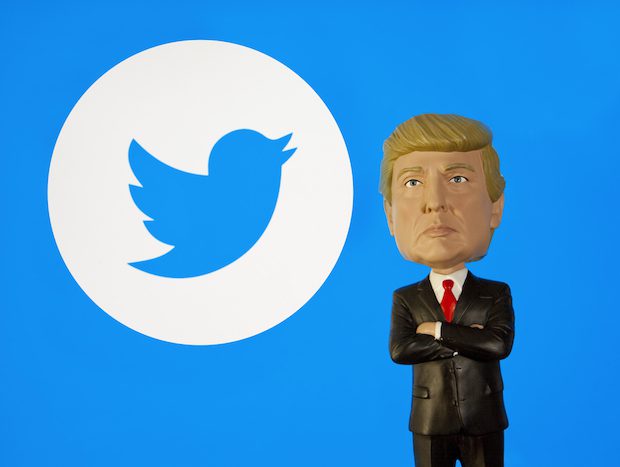Actually, Sir, They Will Lie For You

I was talking with a conservative friend in DC last week, a Trump supporter who expressed intense frustration with his man. He said these idiotic tweets, his lack of personal discipline, and the general chaos in the White House, are destroying the possibility of a transformative presidency. I’m paraphrasing in polite language. He was rather less so in the moment. He said that the wheels are coming off, and setting the stage for a major Democratic comeback — and there will be lots of Republican blood on the tracks.
Maybe so. It is undeniable, though, that Trump is his own worst enemy — especially with his tweets. Rich Lowry explains:
Every administration gets knocked off its game early on by something. What makes the furor over President Trump’s wiretapping claims so remarkable is how unnecessary it is. The flap didn’t arise from events outside of the administration’s control, nor was it a clever trap sprung by its adversaries. The president went out of his way to initiate it. He picked up his phone and tweeted allegations that he had no idea were true or not, either to distract from what he thought was a bad news cycle, or to vent, or both.
The fallout has proved that there is no such a thing as “just a tweet” from the most powerful man on the planet. Trump’s aides have scrambled to find some justification for the statements after-the-fact and offended an age-old foreign ally in the process (White House press secretary Sean Spicer suggested it was British intelligence that might have been monitoring Trump); congressional leaders have become consumed with the matter; and it has dominated news coverage for weeks. Such is the power of a couple of blasts of 140 characters or less from the president of the United States.
The flap has probably undermined Trump’s political standing, and at the very least has diverted him and his team from much more important work on Capitol Hill, where his agenda will rise or fall. In an alternative and more conventional universe, the White House would be crowing over Judge Gorsuch’s testimony before Congress. Instead it is jousting with the FBI director over wayward tweets.
David French continues in this vein:
The tweets, however, are exposing something else in many of Trump’s friends and supporters — an extremely high tolerance for dishonesty and an oft-enthusiastic willingness to defend sheer nonsense. Yes, I know full well that many of his supporters take him “seriously, not literally,” but that’s a grave mistake. My words are of far lesser consequence than the president’s, yet I live my life knowing that willful, reckless, or even negligent falsehood can end my career overnight. It can end friendships instantaneously. Why is the truth somehow less important when the falsehoods come from the most powerful and arguably most famous man in the world?
I’ve watched Christian friends laugh hysterically at Trump’s tweets, positively delighted that they cause fits of rage on the other side. I’ve watched them excuse falsehoods from reflexively-defensive White House aides, claiming “it’s just their job” to defend the president. Since when is it any person’s job to help their boss spew falsehoods into the public domain? And if that does somehow come to be your job, aren’t you bound by honor to resign? It is not difficult, in a free society, to tell a man (no matter how powerful they are or how much you love access to that power), “Sir, I will not lie for you.”
French goes on: “The truth still matters, even when fighting Democrats you despise.”
Does it, though? I mean, it should, but haven’t we determined already that for more than a few conservatives, principles are nothing more than clubs with which to beat liberals?
UPDATE: David J. White gets it right:
The problem for the Democrats, when they come back is that, as we have seen, what any one president does affects the presidency itself and has repercussions for his successors. For example, as we have seen, a president who governs by executive orders or wages undeclared wars without explicit authorization from Congress enables his successors, even those from the other party, to do the same.
I think Trump’s behavior will be seen to have diminished the stature not only of his presidency, but of the office of the presidency itself, and that is something that his successors, regardless of their party, will have to deal with.
Subscribe for as little as $5/mo to start commenting on Rod’s blog.